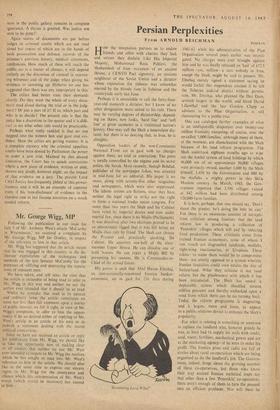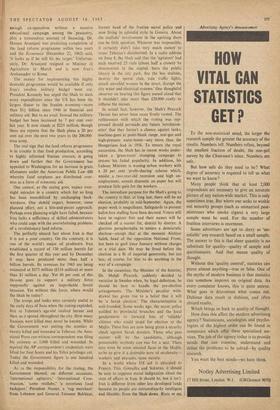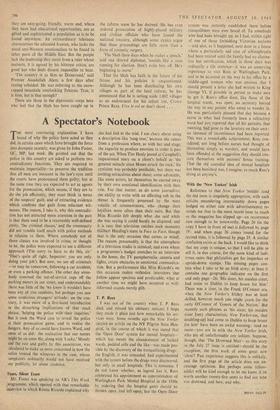Persian Perplexities
From ARNOLD BEICIIMAN TEHUR How the temptation pursues us to endow friends and allies with charms they lack and virtues they disdain. Like His Iiiiperial Majesty, Mohammad Reza Pahlavi, the Shahanshah of Iran—occupant of an ancient throne, a CENTO Pact signatory, an anxious neighbour of the Soviet Union and a dictator whose reputation for tidiness was somewhat marred by the bloody riots in Teheran and the countryside early last June.
Perhaps it is unsociable to call the forty-four- year-old monarch a dictator, but I know of no other designation morel suited to his rule. There may be varying degrees of dictatorship, depend- ing on thaws, new looks, 'hard line' and 'soft line' at given moments in a victimised nation's history. One may call the Shah a benevolent dic- tator, but there is no denying that, in Iran, he is almighty.
Opposition leaders of the non-Communist National Front are in gaol with no charges against them, no trial or conviction. The press is totally controlled by the regime and its secret police, the Savak. Most recently, Sadegh Behdad, publisher of the newspaper !chair, was arrested in mid-June for an editorial. His paper is no more, Along with seventy-five other magazines and newspapers, which were also suppressed. The labour unions are fictions, since they have neither the legal right to strike nor the right to form a national trades union congress. For more than two years the Shah and his Cabinet have ruled by imperial decree and now under martial law, since there is no Majlis (Parliament). It was dissolved after two elections proved to be so obnoxiously rigged that it was felt better no Majlis than rule by fraud. The Shah can choose the Premier and, practically speaking, the Cabinet. He 'appoints one-half of the sixty- member Upper House. He can dissolve one or both houses. He can reject a Majlis Bill by presenting his reasons. He is Commander-in- Chief of the armed forces.
His power is such that Abul Hasan Ebtehaj, an internationally-renowned Iranian banker- economist, sat in gaol for 216 days during
'Screamitig Lord ll'ho?'
1961-62 while his administration of the Plan Organisation several years earlier was investi- gated. No charges were ever brought against him and he was finally released on 'bail' of £52.5 million—yes, million—a sum nobody in Iran,. except the Shah, might be said to possess. Mr. Ebtehaj merely signed a statement saying he would forfeit this stupendous amount if he left the Teheran judicial district without permis- sion. Mr. Ebtehaj, who planned the Dez Dam, seventh largest in the world, and hired David Lilienthal and the late 'Gordon Clapp as advisers to the Plan Organisation, is still clamouring for a public trial.
One can catalogue further examples of what is an undisputable despotism over twenty-one million Iranians; excepting, of course, over the so-called '1,000 families,' although many of them, at the moment, are disenchanted with the Shah because of his land reform programme. The Shah undertook eighteen months ago to wipe out the feudal system of land holdings by which 46,000 Out of an approximate 50,000 villages were privately owned, another 1,600 by the Shah himself, 1,450 by the Government and 900 by the mullahs, a mighty power in this Shi'a Moslem country. In March, 1963, the Gov- ernment reported that 3,700 villages valued at $42 million had been distributed among 120,000 farm families.
It is here, perhaps, that one should say, 'Don't shoot the pianist; he's doing the best he can.' For there is an enormous 'amount of surrepti- tious criticism among Iranians that the land reform law is producing a collection of 'Potemkin' villages which will end by reducing food production. These criticisms come from trained Iranian economists, none of whom I can vouch are disgruntled landlords, mullahs, right-wing reactionaries, or Utopians. These critics—to name them would be to compromise them—are utterly opposed to a system whereby Iranian feudalists could own estates the size of Switzerland. What they criticise is not land reform but the planlessness with which it has been introduced. The Shah has ended a deplorable system which shackled sixteen million peasants and thereby embarked upon a road from which there can be no turning back. Today the reform programme is stagnating, and it begins, more and more, to appear as a public relations device to enhance the Shah's popularity.
For what is missing is something or someone to replace the landlord who, however greedy he was, at least had to supply his serfs with credit, seed, water, fertiliser, mechanical power and act as the marketing agency—if he were to make his profit. The Iranian press and radio are full of stories about rural co-operatives which are being organised-to do the landlord's job. The Govern- ment, indeed, brags about the growing number of these co-operatives, but those who know their way around Iranian statistical traps say that other than a few 'Potemkin co-operatives, there aren't enough of them to turn the peasant into an efficient producer. Nor will there be enough co-operatives without a massive educational campaign among the 'peasantry, plus a tremendous amount of financing. Dr. Hassan Arsanjani was predicting completion of the land reform programme within two years and the Economist (December 22, 1962) said, 'it looks as if he will hit his target.' Unfortun- ately, Dr. Arsanjani resigned as Minister of Agriculture in March and is now Iran's Ambassador to Rome.
The money for implementing this highly desirable programme would be available if only Iran's swollen military budget were cut. President Kennedy has urged the Shah to slash army expenditures since the US has been the largest donor to the Iranian economy—more than $11 billion since 1946 in financial and military aid. But to no avail. Instead the military budget has been increased by 7 per cent over last year. It now stands at $225 million, though there are reports that the Shah plans a 20 per cent cut over the next two years in the 200,000- man army.
The real sign that the land reform programme is in trouble is that food production, according to highly informed Iranian sources, is going down and further that the Government has appealed to Washington for an increase in grain allotments under the American Public Law 480 whereby food surpluses are distributed over- seas as a form of economic aid.
One cannot, as the saying goes, expect over- night miracles in a country which for so long has been immobilised by unchanging back- wardness. One shctuld expect, however, some planned effort, not a bits-and-pieces approach. Perhaps even planning might have failed, because Iran lacks a sufficiency of skilled administrators who could cope with the overwhelming problems of a revolutionary land reform.
The perfectly absurd fact about Iran is that it is not a poor country. On the contrary, it is one of the world's major oil producers. Iran established a record of 130 million barrels for the first quarter of this year and by December it may have produced more than half a billion barrels. Its revenues for 1963 are being estimated at $375 million (£134 million) or more than $1 million a day. Yet 60 per cent of this income goes to support a military force supposedly against an improbable Soviet invasion. Yet without this force, where would the Shah be today?
The troops and tanks were certainly useful in the early days of June when the rioting exploded, first in Teheran's age-old vaulted bazaar and then, as it spread, throughout the city. How many Iranians were killed may never be known. While the Government was putting the number at twenty killed and wounded ia Teheran, the Asso- ciated Press eye-witness correspondent was filing his estimate as 1,000 killed and wounded. In reprisal the AP correspondent's credentials were lifted for four hours and his Telex privileges cut. Today the Government figure is one hundred killed and wounded.
As to the responsibility for the rioting, the Government blamed, on different occasions, 'international agitators,' international Com- munism,' some mullahs,' a notorious food racketeer,' President Nasser, a 'rug merchant' from Lebanon and General Teimour Bakhtiar, former head of the Iranian secret' police and now living in splendid exile in Geneva. About the mullahs' involvement in the uprising there can be little question. Whoever was responsible, it certainly didn't take very much money to rouse Teheran's disinherited. In a radio address on June 8, the Shah said that the 'agitators' had each received 25 rials (about half a crown) `to demonstrate in the capital, burn the public library in the city park, fire the bus stations, destroy the sports club, ruin traffic lights, attack unveiled women in the street, disrupt the city water and electrical systems.' One thoughtful observer on hearing this figure mused aloud that it shouldn't take more than £20,000 really to inflame the masses.
In actual fact, however, the Shah's Peacock Throne has never been more firmly rooted. The ruthlessness with which the rioting was sup- pressed should persuade any future 'revolution- aries' that they haven't a chance against tanks, machine-guns at point-blank range, tear-gas and high-pressure water-hoses—any more than the Hungarians had in 1956. To ensure the royal succession, the Shah has in recent weeks under- taken a 'grass-roots' stumping campaign to restore his faded popularity. In addition, his Labour Minister is wooing urban workers with a 20 per cent 'profit-sharing' scheme which, amidst a two-year-old recession and high un- employment, sounds dramatic on paper but will produce little gain for the workers.
The immediate purpose for the Shah's going to the country is that, at long last, there will be an election, probably in mid-September. Again, the paper work is magnificent. Safeguards to prevent ballot-box stuffing have been decreed. Voters will have to register first and their names will be checked off a master list, district by district. A glorious paraphernalia to ensure a democratic election—except that at the moment Alahyar Saleh, head of the opposition National Front, has been in gaol since January without charges or a trial date. He may be freed before the election in a fit of imperial generosity, but too late, of course, for him to do anything in the way of a campaign.
In the meantime, the Minister of the Interior, Dr. Mehdi Pirasteh, suddenly decided to vacation in Sweden when, by legal definition, he should be here to handle the pre-election arrangements. The Minister's peculiar with- drawal has given rise to a belief that it will be 'a Savak election.' The characterisation is well-founded. Some weeks ago, the secret police notified its provincial branches and the local gendarmerie to forward lists of 'reliable' citizens who could stand 'for election to the Majlis. These lists are now being given a security check against Savak dossiers. Those who pass muster will be the candidates, although presumably anybody can run for a seat. There may even be some unusual faces in the Majlis- to-be to give it a desirable note of modernity-- workers and peasants, tame variety.
In a world where US aid is allocated to Franco, Tito, Gomulka and Sukarno, it should be easy to suppress moral indignation about the state of affairs in Iran. It should be, but it isn't. Iran is different from other less developed lands because its people are extraordinarily intelligent and likeable, from the Shah down. Riots or no, they are easy-going, friendly, warm and, where they have had educational opportunities, are as gifted and sophisticated a population as is to be found anywhere. An extraordinary tolerance characterises the educated Iranian, who lacks the usual anti-Western emotionalism to be found in other parts of the Middle East. But the people lack the leadership they merit from ruler whose instincts, it is agreed by his bitterest critics, are good but who finds dissent impossible to bear.
'The country is as firm as Damevand,' said Premier Assadullah Alam, a few days after rioting subsided. He was referring to the snow- capped mountain overlooking Teheran. True, it is firm, but is that enough?
There are those in the diplomatic corps here who feel that the Shah has been caught up in the reform wave he has decreed. He has, even ordered prosecution of highly-placed military and civilian officials who have looted the national treasury, although some cynics argue that these proceedings are little more than a form of cosmetic surgery.
The Shah these days when he makes a, speech,' said one shrewd diplomat, 'sounds like a man running for election. Don't write him off. He's beginning to move.'
That the Shah has faith in the future of his throne and his policies is unquestioned. Although he has been distributing his own villages as part of the land reform, he has announced that he is setting aside 1,092 villages as an endowment for his infant son, Crown Prince Reza. Yive le roi or don't shoot ...
































 Previous page
Previous page